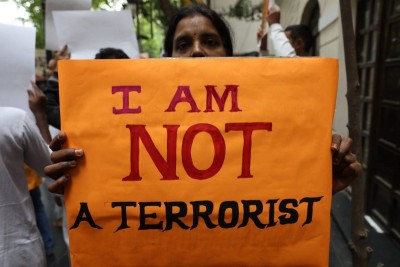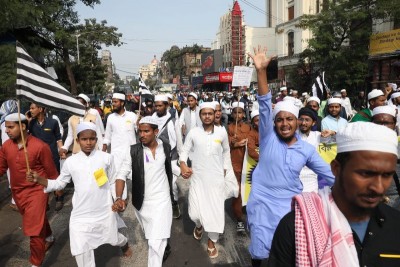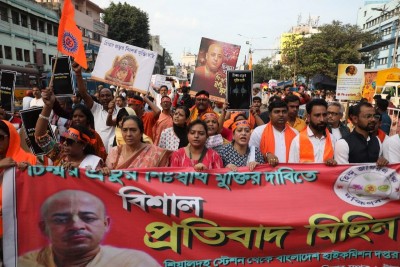
SAARC leaders led by India deliberate on strategies to combat Coronavirus
New Delhi: With the death toll due to coronavirus outbreak touching 6000 globally, leaders of the South Asian Association for Regional Cooperation (SAARC) on Sunday attended a video conference where they deliberated on the possible measures needed to be adopted to prevent the virus from further damaging normal life in the region.
Apart from Indian Prime Minister Narendra Modi, who had initiated the talks, the video conference was attended by Afghanistan President Ashraf Ghani, Maldives President Ibrahim Mohamed Solih, Sri Lankan President Gotabaya Rajapaksa, Bhutan PM Lotay Tshering, Bangladesh PM Sheikh Hasina, Sri Lankan PM KP Sharma Oli and Pakistan's Special Assistant to the Prime Minister on Health Dr Zafar Mirza.
During the conference, Modi proposed the creation of a COVID-19 Emergency Fund based on voluntary contributions from all the countries, with India making an initial offer of US $10 million for the fund.
The fund can be used by any of the partner countries to meet the cost of immediate actions.
He informed that India is assembling a Rapid Response Team of doctors and specialists, along with testing kits and other equipment, which will be on stand-by, to be placed at the disposal of the countries, if required.
The Indian Prime Minister also offered arranging for online training capsules for the emergency response teams of the neighbouring countries and sharing of software behind India’s Integrated Disease Surveillance Portal to help trace possible virus carriers and the people they contacted.
He suggested that existing mechanisms like SAARC Disaster Management Centre can be used to pool in best practises.
He also suggested creation of a common Research Platform to coordinate research on controlling epidemic diseases within the South Asian region.
He suggested further brainstorming by experts on the long-term economic consequences of COVID-19, and how best to insulate internal trade and local value chains from its impact.
President Ashraf Ghani said that the greatest vulnerability of Afghanistan is an open border with Iran. He proposed modelling diffusion patterns, creation of common framework for telemedicine and greater cooperation amongst the neighbouring countries.
Ibrahim Mohamed Solih highlighted the negative impact of COVID-19 on tourism in the country and its impact on the nation’s economy.
He proposed closer cooperation between the health emergency agencies of the countries, formulation of economic relief package and long term recovery plan for the region.
Rajapaksa recommended that SAARC leaders work together to help economy tide over the difficult period.
He also recommended the establishment of a SAARC Ministerial level group to share best practises and coordinate regional matters on combating COVID-19.
During the interaction, the first such video conference between SAARC leaders ever since the COVID19 outbreak left several countries in the world badly hit, PM Sheikh Hasina proposed continuance of the dialogue at technical level through video conference between Health Ministers and Secretaries of the region.
Oli apprised the SAARC leaders of the steps taken by Nepal to combat COVID-19 . He said that the collective wisdom and efforts of all the SAARC nations could help in devising a robust and effective strategy to deal with the pandemic.
Bhutanese leader Lotay Tshering said the pandemic does-not follow geographical boundaries, hence it is all the more important for the nations to work together. He said the pandemic will affect the smaller and vulnerable economies disproportionately, talking about the economic impact of COVID-19.
Mirza proposed that SAARC Secretariat be mandated to establish a working group of national authorities for health Information, data exchange and coordination in real time.
Would like to thank all distinguished SAARC leaders who joined today’s video conference to tackle COVID-19 Novel Coronavirus and shared best practices from their respective nations to overcome this challenge as well as fruitful suggestions on creating a healthier region. pic.twitter.com/RGYDrub4xq
— Narendra Modi (@narendramodi) March 15, 2020
He proposed hosting SAARC Health Ministers’ conference and development of regional mechanisms to share disease surveillance data in real time.
A total of 1,52,428 confirmed cases of the novel coronavirus disease have been reported globally as of Sunday morning, a World Health Organization (WHO) spokesperson said.
Among confirmed infections, 5,720 patients have died, with the number of affected countries and regions rising to 141, Fadela Chaib told China's news agency Xinhua.
As the virus spreads increasingly worldwide, WHO has characterised COVID-19 as a "pandemic," noting Europe has become the epicenter of the disease.
Support Our Journalism
We cannot do without you.. your contribution supports unbiased journalism
IBNS is not driven by any ism- not wokeism, not racism, not skewed secularism, not hyper right-wing or left liberal ideals, nor by any hardline religious beliefs or hyper nationalism. We want to serve you good old objective news, as they are. We do not judge or preach. We let people decide for themselves. We only try to present factual and well-sourced news.







